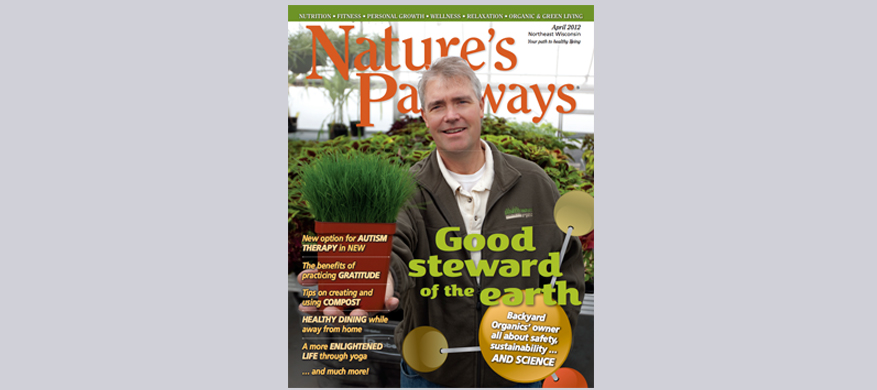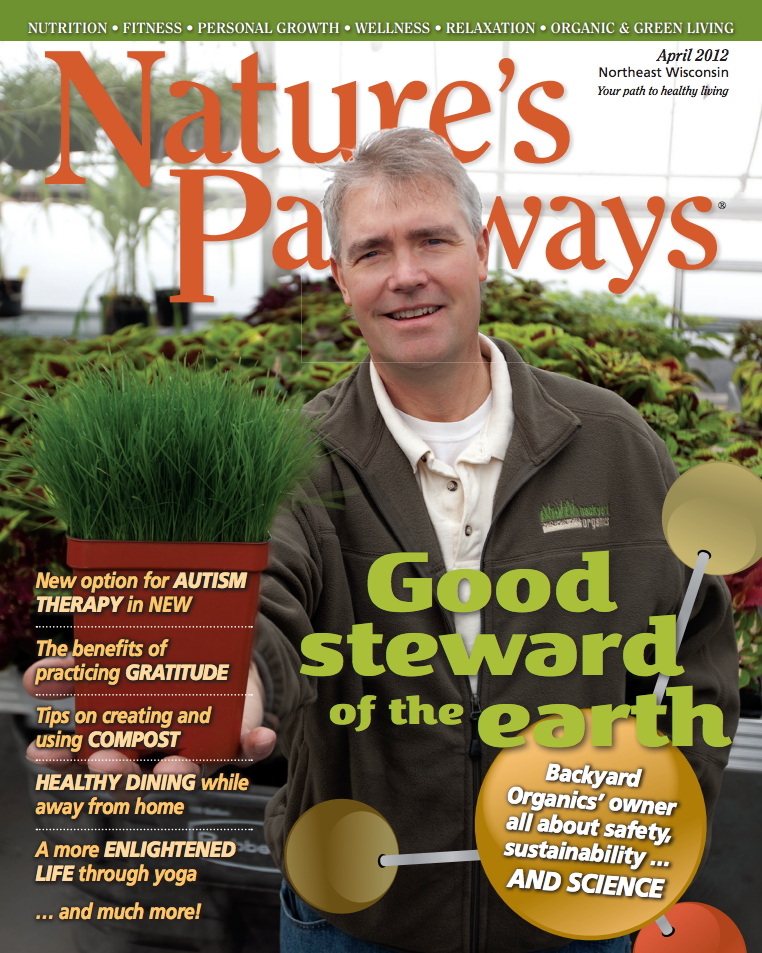“ Doing well is the result of doing good. That’s what capitalism is all about.” –Ralph Waldo Emerson
last year, when Todd Rockweit found himself retired from his career as an engineer and business owner, and a new father to a precious 1-year-old daughter, he had an opportunity to do something many of us never get a chance to do; take a step back and assess his future.
At this stage in life, what he was really looking for personally and professionally boiled down to three main concerns: balance, purpose and practicality. Much like Emerson’s belief above, Rockweit wanted to devote his time to something more purposeful and for the greater good.
During the time he was evaluating available businesses, he happened to call on Backyard Organics, an organic lawn care service for residential and commercial properties, because he had concerns about the safety of his family, pets and the planet when it came to treating his yard with chemicals.
Rockweit’s interest was piqued when the owner explained the process and the science behind the organic approach. Shortly thereafter, his entrepreneurial spirit moved him to make an offer for the business; which was accepted.
Backyard Organics began operations in 2004 and incorporated in 2006 – the first company of its kind in Wisconsin. It was also the first organic lawn care business to become accredited by the Northeast Organic Farming Association (NOFA), one of only two organizations in the country that accredit organic land care professionals. Similar to Rockweit, the couple who started the business desired a safe and healthy lawn for their family.
Upon taking the reigns, Rockweit learned to have a better understanding of the complexities of natural ecology and soil biology. One of his main resources: Jim Beard, lead horticulture instructor at FVTC. In fact, Rockweit and Beard are two of only four individuals in Wisconsin certified in organic land care by NOFA. The two have monthly discussions about current topics, research and, most importantly, the science behind organics.
As Beard explains, “Before the 1940s, there was no issue with organics, as everything was chemical free; but after that point in time we started to get into synthetics. Today, there is information available that things we are putting in our planet are unhealthy.” Not only is there a health issue for humans and animals, but there is also a negative effect on soil biology. “Since chemistry kills the biology in the soil, the application of these synthetics on our lawns and fields disrupts the natural process at work there,” says Beard.
Once your soil has been depleted of microbial activity, your plants then become dependent on the synthetic nutrients, which results in high costs, ecological side effects and unpredictable outcomes. Dixie McLaughlin, a Town of Menasha resident and Backyard Organics customer concurs, “We don’t realize what we’re putting on and in the ground … we need to respect the Earth and let nature work for us.”
That’s exactly what organic lawn care specialists believe. The best defense for weeds, in their opinion, is a healthy plant, which can only happen with healthy soil. This should include growing live, active microbes in the soil, and good bacteria and fungi activity.
The approach Rockweit takes with Backyard Organics is all about the soil and building up the biology there. “We focus on improving your soil through an appropriate balance of biology and nutrients and improving the soil texture and structure,” he points out. “This takes time if your soil is out of balance; it’s not a quick fix.” However, once the soil is established, it can maintain itself, considering no further chemical application.
The process at Backyard Organics begins with an onsite consultation. Rockweit, along with the help of Jim Bosanny, takes this opportunity to get a feel for where you are at regarding organic land care and starts the educational process from that point forward – always respectful of the fact that people are in different places in the move to organics. During this visit, your yard is measured, you discuss your needs and concerns, and a soil sample is obtained.
Soil samples are thoroughly tested at a lab in Nebraska and results are e-mailed within five days. Ideally, soil is 25% water, 25% air, 40-45% sand, silt, clay and 5-10% organic material, according to Beard.
Next in the process, Rockweit considers the soil sample results and develops a plan specific to your property. An estimate is prepared and e-mailed to you. (Rockweit tries to keep his business as paperless as possible.) You then have the option to make an environmentally friendly choice in maintaining your property.
Once the required nutrients are returned to the soil, “ … it rebuilds a soil food web, which reduces dependency on fertilizers and pesticides, improves plant growth, reduces diseases, water use and toxicity, and encourages the healthy establishment of healthy biology,” as Dr. Elaine Ingham, president and director of research at Soil Foodweb, Inc., explains.
The customized organic blend that is used for each property, based on soil test results, consists of various nutrients and compost tea. The formulation is able to be perfected through the use of an onsite biological microscope, which enables Rockweit to continuously quality control his products and service. He also recently purchased commercial brewing equipment (the same equipment used by Harvard University, the Brooklyn Bridge Park in N.Y. and Paul Newman’s Estate in Conn.), which gives him greater ability to formulate the tea extract for specific concerns he runs into. These help him offer the most diverse and active blend of microbial activity available.
Backyard Organics also offers some of its repellant products for sale. One of the outlets is Just Act Natural, the store that makes green living easy. According to owner, J.C. Paustian, “I offer the products because they are inline with our mission. The best seller here is Weed-A-Tak, a Roundup® alternative. People keep coming back for it. I’ve had all positive feedback on their products. And, Todd is always so positive, always the optimist. ”
Whether you’re in the camp that believes we are in an ecologic crisis or the camp that feels we, as humans, have dominion over nature; we all must consider, with “careful understanding that Earth and its resources are for any generation a restricted gift held in trust for future generations,” as Dr. J. Patrick Dobel so eloquently puts it.
We have taken a step in the right direction, as states on the coasts of the United States have banned the use of pesticides and chemicals. It may not be long before this consciousness reaches the Midwest. So, it’s just a matter of time before we can say goodbye to chemical lawn care for good.
In the meantime, Rockweit does his best to learn and educate customers from Door County to Fond du Lac on organic land care practices. Customers like McLaughlin appreciate the information he shares and the positive, helpful person that he is. “He cares deeply about his community,” she says.
Another way he shows his commitment is through the various charities he’s involved with and donates services to. Last year, Rockweit donated 20% of sales back to the community, which included landscape work for Habitat for Humanity homes.
For his opportunity to make a difference in our world, he credits his wife and her support. “I really enjoy this business and it feels like the most purposeful career I’ve had since college,” he says.

